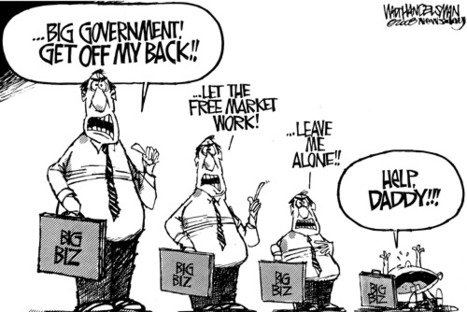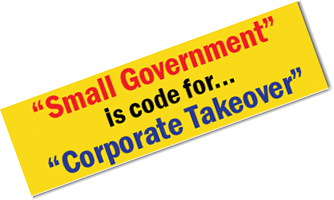Small government, like communism, might sound like a good idea but they are lambs for slaughter on the altar of greed

Deregulation, self-regulation, red tape, green tape, nanny state, small government, privatisation, asset recycling, compliance costs, free market, one-stop shop – these are some of the phrases religiously chanted by big business, and echoed by conservative think tanks and governments, with a certainty that smacks of zealotry.
We are told that the private sector is more efficient so we outsource service provision to them. We sell off valuable assets and profitable government-owned enterprises. We remove regulatory oversight and streamline approval processes.
We sack public servants, urge wage restraint, remove penalty rates, freeze the superannuation guarantee and hobble collective bargaining.
We provide so many concessions for the owners of capital and assets that they end up paying little to no tax. We encourage exports whilst enduring shortages at home. We provide a guarantee for the banks to protect them from the financial turmoil afflicting the rest of the world. We have a whole government department dedicated to making sure the private sector does not face unfair competition from the public sector.
And still, even as companies continue to announce record profits, it’s not enough – they want more.
Now that may all be very well if all players are acting ethically, if profits are shared not only with CEOs and shareholders but with employees through job creation and wage rises and with the government through taxation, if sustainable practice and environmental protection was a non-negotiable aspect of doing business, if businesses could be trusted to tell the truth and to fulfil their part of the social contract.
But that is not the case.
The cases of malfeasance, corruption, fraud, exploitation and environmental damage just keep coming. Cases are fought by armies of legal and financial teams, dragging them out until plaintiffs give in. Penalties are seen as just part of doing business.
By their own actions, businesses have destroyed our trust and forfeited the right to dictate the rules. Self-regulation does not work. There is no loyalty or morality as the greedy scramble for an ever-increasing share of the pie, doling out crumbs that barely sustain the rest of society.
The government has abrogated their responsibility to defend us against unscrupulous merchants and employers, and the extreme class structure that results from their exploitation. They have sold off our common wealth for short-term sugar hits for the budget. They have privatised essential utilities and services which are now run for profit rather than the common good.
And now they are even outsourcing the drafting of legislation to the very legal and accounting firms that advise big business on how to get around the rules.
Small government, like communism, might sound like a good idea but they are lambs for slaughter on the altar of greed.









